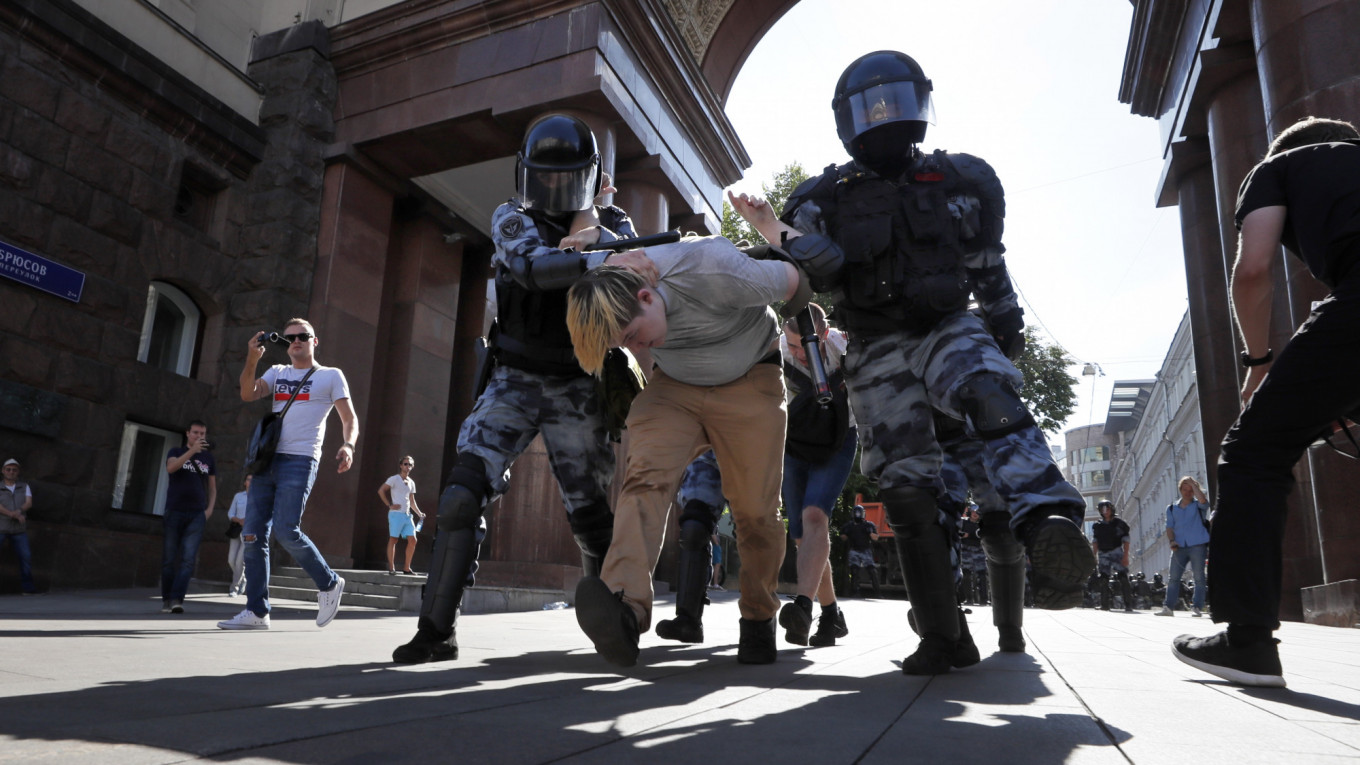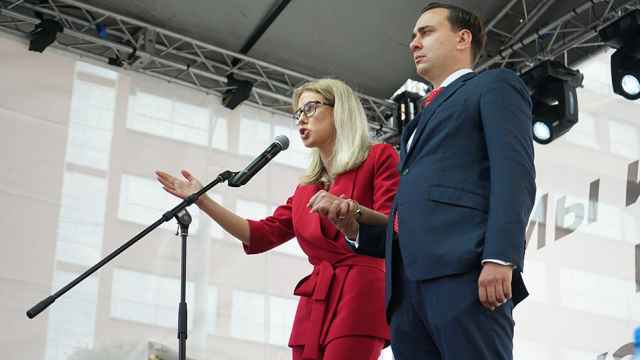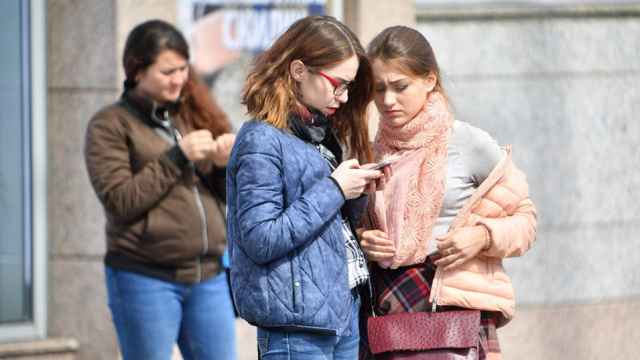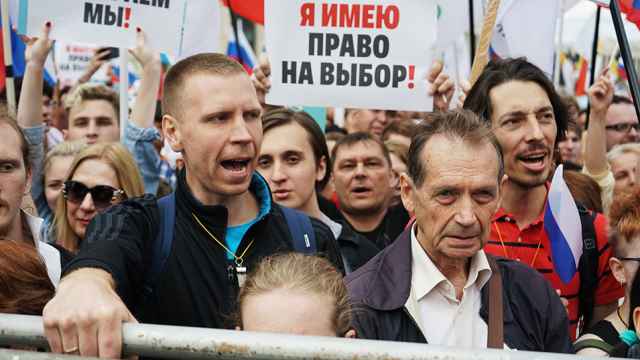For two weeks, the authorities had allowed Russia’s political opposition to vent frustration in the capital’s streets over the decision of election officials to bar anti-establishment candidates from running in upcoming local elections.
But after some 22,500 people turned out for a protest in central Moscow last weekend that was approved by city officials — the largest showing at an opposition-led rally in recent years — the authorities decided that enough was enough.
“Attempts to give ultimatums and organize riots will not bring anything good,” Moscow Mayor Sergei Sobyanin wrote on Twitter Saturday morning, issuing a rare warning in advance of a follow-up protest. “Order in the city will be ensured in accordance with the law.”
The subsequent protest on Saturday was the latest in a rising tide of civil unrest across Russia sparked by dissatisfaction over declining living standards that has led to falling ratings for Russian President Vladimir Putin and the ruling United Russia party.
Called by opposition leader Alexei Navalny to take place outside of City Hall, just a stone’s throw away from the Kremlin, the demonstration demanded that opposition candidates be allowed on the ballot in September’s Moscow City Duma elections.
Election officials had barred more than a dozen candidates this month, including Navalny allies Ilya Yashin, Lyubov Sobol and Ivan Zhdanov, for allegedly failing to collect the necessary number of signatures from voters to qualify for the ballot. The candidates, in turn, said they had been unfairly excluded despite meeting all of the formal requirements, in what they called an attempt by authorities to quash dissent against pro-Kremlin forces in the capital.
Earlier this week, the authorities signaled that they would no longer tolerate the public discontent.
After Russia’s Investigative Committee opened a criminal investigation on Wednesday into the recent protests, Navalny was detained and handed a 30-day sentence for calling people to attend the demonstrations. That night, police conducted night-time raids on the apartments of four leading opposition candidates, seizing their computers and bringing them in for questioning.
Then, on the eve of Saturday’s protest, police again raided the apartments of the opposition candidates, detaining nearly all of them.
Yet despite the absence of the opposition leaders, protesters turned out in droves to voice their discontent on Saturday afternoon.
“What else can we do?” said Margarita Roschenko, 63, when asked outside City Hall if she was worried about getting detained. “We have to fight for our rights somehow.”
Moscow police estimated 3,500 had attended the demonstration, including 700 registered journalists and bloggers. Activists said the number was likely much higher, adding that it was difficult to estimate accurate numbers because the authorities prevented a mass crowd from forming in any one location.
Police cordoned off the street in front of City Hall and had detained some 200 demonstrators before the protest even kicked off at 2 p.m. local time. By the time most of the protesters had dissipated on Saturday evening, police had detained 1,007, the OVD-Info police monitoring group reported, listing cases of violent arrests. By Sunday morning, the number had risen to 1,373.
Police also stormed Navalny’s headquarters, where his aides were streaming live footage of the protest, as well as the studios of the independent Dozhd television channel. The outlet’s editor-in-chief was then summoned for questioning in connection with the criminal investigation into the protests.
Protesters didn’t back down easily, however. At times, they broke through police barricades and clashed with riot police, who used batons and, at least in once instance, tear gas to disperse them.
By evening, hundreds of the leaderless protesters had been split up into individual groups by the police and marched around the city center chanting “Russia will be free” and “Russia without Putin.” They also blocked a main thoroughfare.
Meanwhile, as police clashed with the protesters in Moscow on Saturday afternoon, state television showed Putin descending in a submersible to the seabed in the Gulf of Finland.
“There are lots of problems on Earth,” he told state media after the dive. “You have to go to high places and you have to go underwater so that there are fewer of them.”
For their part, Sobol, Yashin and Zhdanov — three of the most prominent activists in the protests this month — were released later on Saturday from court. Soon after being released, they called for the protesters to reconvene at Trubnaya Square in central Moscow at 7:40 p.m local time to continue the demonstration.
“I’m free and I’m returning to central Moscow!” Sobol, who is on the 14th day of a hunger strike in protest of being barred from the elections, wrote on Twitter.
“I see this as the achievement of all those people who came out [to protest] today!” she added.
Soon after arriving at the square, however, Sobol and Zhdanov were detained for a second time, along with dozens of other protesters.
A Message from The Moscow Times:
Dear readers,
We are facing unprecedented challenges. Russia's Prosecutor General's Office has designated The Moscow Times as an "undesirable" organization, criminalizing our work and putting our staff at risk of prosecution. This follows our earlier unjust labeling as a "foreign agent."
These actions are direct attempts to silence independent journalism in Russia. The authorities claim our work "discredits the decisions of the Russian leadership." We see things differently: we strive to provide accurate, unbiased reporting on Russia.
We, the journalists of The Moscow Times, refuse to be silenced. But to continue our work, we need your help.
Your support, no matter how small, makes a world of difference. If you can, please support us monthly starting from just $2. It's quick to set up, and every contribution makes a significant impact.
By supporting The Moscow Times, you're defending open, independent journalism in the face of repression. Thank you for standing with us.
Remind me later.







